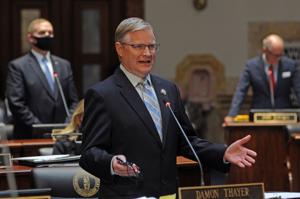Despite divided Republicans, Senate passes Kentucky HHR legislation

(The Center Square) – A bill that would allow Kentucky race tracks to offer gaming machines they say are essential for their live racing products passed a key hurdle as it cleared the state Senate, but not without dividing the Republican majority.
Senate Bill 120 passed by a 22-15 vote, but the 30 Republican members were evenly split. Seven Democrats voted yes to advance the bill to the House. On Wednesday morning, the House Licensing, Occupations and Administrative Regulations Committee voted unanimously in favor of the bill.
The bill includes historical horse racing (HHR) as an acceptable pari-mutuel wager and allows the Kentucky Horse Racing Commission (KHRC) to approve their use at tracks and satellite facilities. The legislation is needed after a Sept. 24 state Supreme Court said HHR does not meet the definition of pari-mutuel betting and that the commission lacked the authority to approve a new gaming system.
HHR machines look like slot machines at a casino but use a player’s bets on the outcome of previously run races to determine if the wager wins. The case to determine the legality of the machines has lasted about a decade, with tracks installing thousands of such machines since then.
Churchill Downs, Keeneland, The Red Mile, Ellis Park and Kentucky Downs have used the machines to generate millions of dollars in revenue in recent years. The proceeds, track officials say, have helped them make improvements at their tracks and increase purses to attract better trainers, jockeys and horses.
“It has made our racing circuit competitive with other states and has allowed us to invest in our communities here in the Commonwealth, leading to new jobs, tourism and economic development,” Louisville-based Churchill Downs Inc. said in a statement.
However, Republicans in the Senate were divided over the issue.
Some, like Majority Floor Leader Damon Thayer, R-Georgetown, and bill sponsor state Sen. John Schickel, R-Union, say the machines protect thousands of jobs in racing and agriculture, both of which are vital industries in the state.
However, several Senate Republicans view HHR as casino gaming and harmful to families. Most of the money raised from the machines would come from Kentucky families.
“Gaming in all its forms is predatory and bad public policy,” state Sen. Whitney Westerfield, R-Crofton, said. “It’s an industry predicated on the losses of its patrons.”
Westerfield is one of three Republican senators who have HHR facilities in their district who voted against the bill.
Martin Cothran, a spokesperson for the Family Foundation of Kentucky, has called it a “stimulus bill” for racing industry executives and stock owners. He also predicted the machines will eventually overtake live racing in the state.
The Family Foundation challenged the legality of the machines in court, after tracks first sought judicial approval, leading to last fall’s ruling that’s put the onus on lawmakers.
The debate shifted to the House on Wednesday, and while the bill passed in committee, even some supporters said they have concerns. State Rep. Jerry Miller, R-Eastwood, said he would rather discuss a constitutional amendment since a state law may not stand against another legal challenge that will come if lawmakers pass the bill.
The bill went through the Senate in less than a week, and while it’s possible a House vote could come in quick fashion, many of the concerns some Republicans had in the Senate will be echoed in the House as well.
“There are some more conversations to be had in our caucus,” House Licensing, Occupations and Administrative Regulations Committee Chairman Adam Koenig, R-Erlanger, told The Center Square on Wednesday. Koenig is a strong supporter of the bill.
Republicans control 75 of the 100 House seats. It’s uncertain if a majority of the GOP in the chamber will back the bill.
And unlike the Senate, House Democrats may not be as solidly behind the legislation. In the past week, 15 of the 25 Democrats signed an op-ed calling for an increase in taxes on HHR revenue. They say it could generate about $100 million annually for education, health care and other needs.
Disclaimer: This content is distributed by The Center Square
